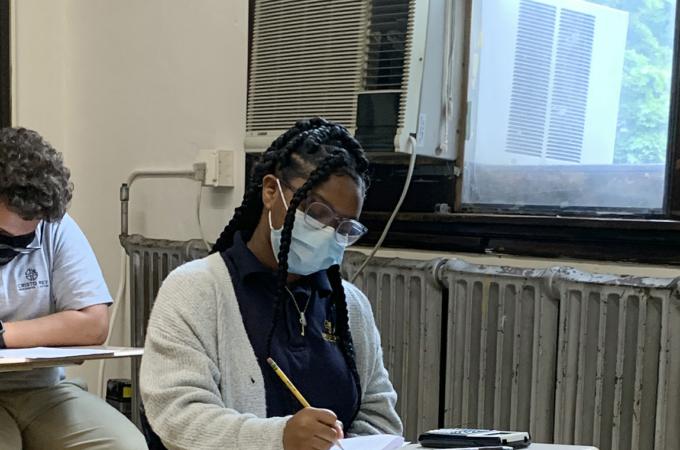Cristo Rey Boston grants full tuition to all students
DORCHESTER -- Cristo Rey schools have long been known for their innovative approach to make a Catholic school education affordable to low-income students. But beginning this month, Cristo Rey Boston High School is taking that commitment a step further -- by granting full-tuition scholarships to all current and incoming students.
School president Rosemary J. Powers said their board of trustees made the decision to grant the scholarships that went into effect Feb. 1 in recognition of the challenges that many students and their families are experiencing during the pandemic. Many families are in danger of unemployment or eviction, and students living in multi-generational households are afraid of bringing the virus into their home.
"If we're about removing barriers for our students to be successful in life and in the world, then this was a necessary and appropriate step for us to take at this point," Powers said.
Like other schools in the Cristo Rey Network, Cristo Rey Boston High School exclusively serves students from families of limited economic resources.
"In supplying full-tuition scholarships, we strengthen our commitment to closing the opportunity gap for college bound students from under-resourced communities," the school said in a Feb. 5 press release.
Cristo Rey Boston employs a work-study model that requires students to work one day each week, allowing them to gain work experience while also earning money toward tuition.
In a Feb. 23 interview, Powers explained that the cost to educate each student is about $18,000 a year. The students themselves earn about half of that amount through the work-study program. Tuition is said to be about $3,600, but most families pay about $700. The rest is covered by fundraising.
Powers said giving full-tuition scholarships "means that we need to do a little bit more fundraising. But it's marginally more fundraising, it's not dramatically more."
Throughout the pandemic, the school has used a hybrid model, with some students learning at home and others in the classroom. Powers said that when the school year began in August, about 60 percent of the students came back in person. This number went down to 50 percent between Columbus Day and Thanksgiving, and decreased to 30 percent since then.
Even during vacations, holidays, and weeks when they had to be fully remote, the building has stayed open to students, who can receive breakfast and lunch there and have a warm, quiet environment to spend time in.
"If they're living in somewhat crowded living conditions or noisy living conditions, we also want to make sure there's a place for students to be able to study," Powers said.
She expressed appreciation for their corporate work study partners, businesses in Boston that employ Cristo Rey students. While the goal is for every student to have a work-study job, this year only about half of them do. Some are working remotely from home or from the school, while others go out into the workplace. Some businesses have said they cannot take a student at this time, but remain committed to the school and its students, and have agreed to pay their contracts anyway.
"We could not do this work without them," Powers said.
More information about Cristo Rey Boston High School is available at www.cristoreyboston.org.



















